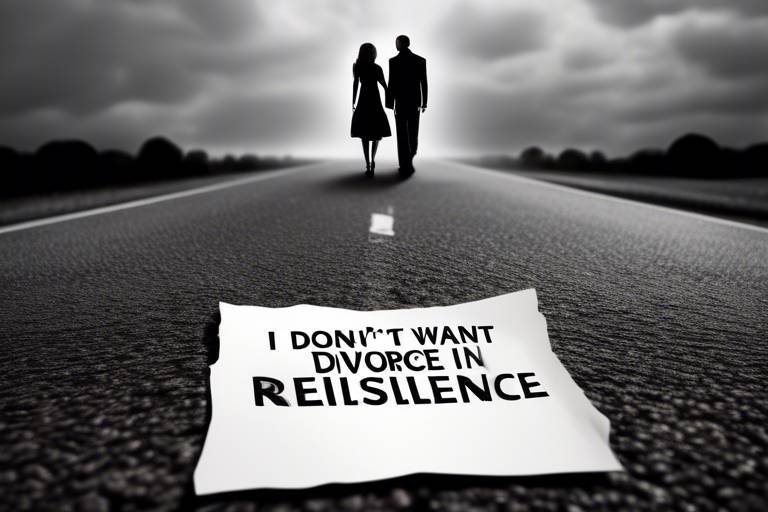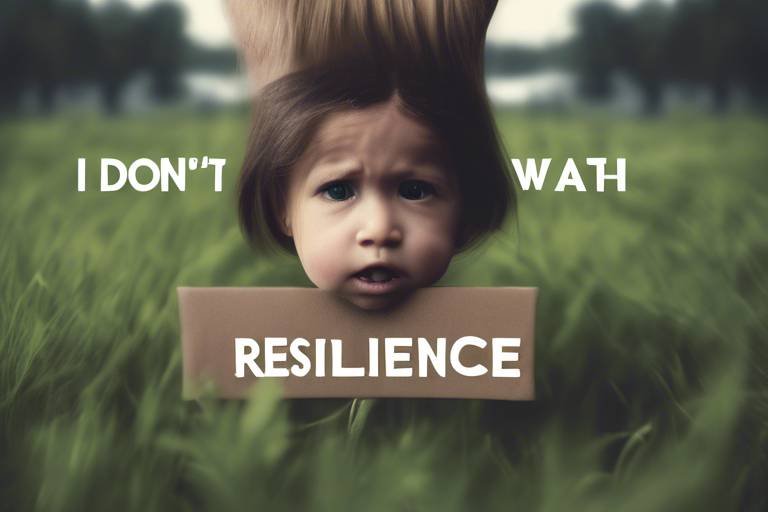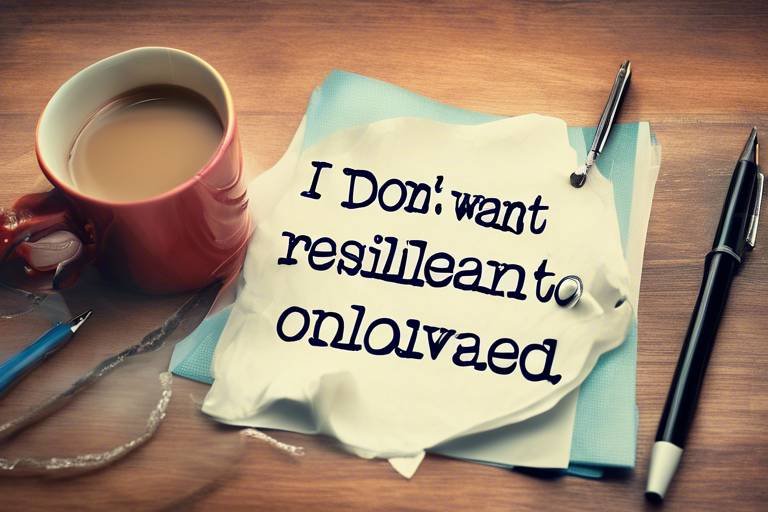Role of Confidence in Conflict Management
In the intricate dance of human interactions, confidence plays a pivotal role, especially when it comes to managing conflicts. Imagine walking into a room filled with tension, where disagreements hang in the air like a thick fog. Now, picture yourself as a confident individual, ready to tackle the situation head-on. This is the essence of confidence in conflict management—it empowers you to approach disputes with a clear mind and a strong presence.
Confidence is not merely about having a loud voice or a dominating personality; it’s about self-assurance and the belief in your ability to navigate through tough conversations. It acts as a guiding light, illuminating pathways to resolution and understanding. In both personal and professional settings, the ability to communicate effectively during conflicts can be the difference between a constructive dialogue and a heated argument.
When individuals exhibit confidence, they are more likely to engage in open and honest communication. They can articulate their thoughts and feelings clearly, which is essential in resolving misunderstandings. Moreover, confidence fosters a sense of safety, encouraging others to express their perspectives without fear of judgment. This creates an environment where collaboration can flourish, leading to more effective conflict resolution.
In essence, confidence is the cornerstone of successful conflict management. It not only enhances communication but also helps individuals maintain their composure under pressure. As we delve deeper into the psychological aspects of confidence and its impact on interpersonal relationships, we will uncover how it shapes perceptions and responses during disputes, ultimately influencing outcomes and relationships.
To grasp the role of confidence in conflict management, it’s crucial to first understand what confidence truly means. At its core, confidence is the belief in one’s abilities and judgment. It manifests in various ways, from how we carry ourselves to how we express our opinions. In personal contexts, confidence can bolster relationships, while in professional settings, it can enhance teamwork and productivity.
Consider this: when you walk into a meeting with a sense of confidence, you are more likely to contribute valuable insights, advocate for your ideas, and engage with colleagues constructively. On the flip side, a lack of confidence can lead to avoidance, miscommunication, and unresolved issues. Therefore, cultivating confidence is not just beneficial; it’s essential for effective conflict management.
Understanding the psychological underpinnings of conflict is key to recognizing how confidence influences our responses. Conflicts often arise from differing perceptions, beliefs, and values. When individuals lack confidence, they may misinterpret others’ intentions or feel threatened, leading to defensive or aggressive behaviors. This cycle can escalate conflicts, making resolution increasingly difficult.
Conversely, confident individuals are more likely to approach conflicts with a problem-solving mindset. They can view disputes as opportunities for growth rather than threats. This shift in perspective can profoundly affect how conflicts are handled, resulting in more constructive outcomes and healthier relationships.
One of the key components of confidence is self-efficacy, which refers to an individual's belief in their ability to succeed in specific situations. In the realm of conflict resolution, self-efficacy plays a critical role. When individuals believe in their skills to manage conflicts effectively, they are more likely to engage in proactive strategies rather than avoid confrontation.
Enhancing self-efficacy involves practical steps that empower individuals in conflict situations. Here are a few strategies:
- Set achievable goals: Break down larger conflicts into smaller, manageable tasks.
- Seek feedback: Constructive criticism can help refine conflict management skills.
- Practice active listening: Understanding others’ perspectives builds confidence in communication.
Addressing self-doubt is crucial for effective conflict management. Negative thoughts can creep in, undermining confidence and leading to avoidance. Combatting these thoughts involves cognitive restructuring, where individuals challenge and replace negative beliefs with positive affirmations. Techniques such as visualization and positive self-talk can significantly boost confidence when facing challenging discussions.
Effective communication is the backbone of conflict management. Confidence directly affects both verbal and non-verbal communication. Confident individuals tend to speak clearly and assertively, which enhances the clarity of their messages. Furthermore, non-verbal cues, such as eye contact and body language, also convey confidence, making it easier for others to engage constructively.
Building confidence is an ongoing process that requires dedication and practice. Here are some strategies:
- Participate in training programs focused on communication and conflict resolution.
- Engage in role-playing scenarios to practice handling conflicts in a safe environment.
- Incorporate mindfulness techniques to enhance self-awareness and emotional regulation.
Role-playing is an effective method for developing confidence in conflict situations. By simulating interactions, individuals can practice their responses and refine their communication skills. This preparation can lead to greater confidence when facing real-life conflicts, allowing them to approach disputes with a sense of readiness.
Mindfulness practices and self-reflection can significantly enhance self-awareness and confidence. These techniques help individuals manage their emotions during conflicts, enabling them to respond thoughtfully rather than react impulsively. By taking time to reflect on past conflicts, individuals can identify patterns, learn from their experiences, and build confidence in their conflict management abilities.
Q: How can I improve my confidence in conflict situations?
A: Start by practicing active listening and seeking feedback from trusted colleagues or friends. Engaging in role-playing scenarios can also help you prepare for real-life conflicts.
Q: What if I still feel anxious during conflicts?
A: It’s normal to feel anxious. Techniques such as mindfulness and deep breathing can help calm your nerves and enhance your focus during challenging discussions.
Q: Can confidence really change the outcome of a conflict?
A: Absolutely! Confidence can lead to clearer communication and a more constructive approach to resolving disputes, ultimately influencing the outcome positively.

Understanding Confidence
Confidence is more than just a buzzword; it's a vital psychological trait that shapes how we approach various situations, especially conflicts. When we think about confidence, we often envision someone who speaks assertively or walks into a room with their head held high. But at its core, confidence is about belief in oneself and one's abilities. It’s the inner voice that says, "I can handle this," even when the stakes are high. In both personal and professional contexts, confidence plays a pivotal role in determining how effectively we manage conflicts.
Imagine you’re in a heated discussion with a colleague about a project that’s gone off the rails. If you lack confidence, you might hesitate to voice your opinions or suggest solutions, fearing rejection or conflict escalation. On the flip side, a confident individual is likely to engage openly, share ideas, and work collaboratively towards resolution. This difference in approach can significantly affect the outcome of the conflict. Confidence not only empowers us to express our thoughts but also enhances our ability to listen and empathize with others, creating a more constructive dialogue.
Moreover, confidence is not just about being assertive; it's also about being resilient. When we face conflicts, the ability to bounce back from setbacks and maintain a positive outlook is crucial. Individuals with high confidence levels are more likely to view challenges as opportunities for growth rather than insurmountable obstacles. This mindset not only facilitates better conflict management but also fosters stronger relationships, as people are drawn to those who exude positivity and assurance.
To better understand confidence, let’s break it down into a few key components:
- Self-Belief: The foundation of confidence lies in believing in one’s skills and abilities.
- Resilience: The capacity to recover quickly from difficulties enhances one’s confidence in handling conflicts.
- Communication Skills: Confident individuals often possess strong communication skills, allowing them to express themselves clearly and effectively.
In conclusion, understanding confidence is essential for anyone looking to improve their conflict management skills. It’s about more than just believing in oneself; it’s about cultivating a mindset that embraces challenges and fosters open communication. As we delve deeper into the role of confidence in conflict management, we will explore how it impacts our interactions and the strategies we can employ to enhance our confidence levels.

The Psychology of Conflict
Conflict is an inevitable part of human interaction, and understanding its psychology is crucial for effective management. At its core, conflict arises when individuals perceive a divergence in goals, values, or interests. But what drives these perceptions? One key factor is confidence. When individuals approach a conflict with a strong sense of self-assurance, they are more likely to engage constructively rather than defensively. This confidence shapes not only how they view the situation but also how they respond to others involved.
To delve deeper, let’s consider how confidence influences our perceptions during disputes. When faced with a disagreement, a confident person is less likely to feel threatened; instead, they may view the conflict as an opportunity for growth or collaboration. This perspective can lead to more open-minded discussions, allowing for creative solutions to emerge. Conversely, a lack of confidence can result in a defensive stance, where individuals may resort to aggressive tactics or avoidance, further escalating the conflict.
Additionally, the psychological concept of self-efficacy plays a significant role in conflict situations. Self-efficacy refers to an individual’s belief in their ability to succeed in specific situations. When individuals believe they can effectively manage a conflict, they are more likely to employ constructive strategies. This self-belief not only enhances their approach to conflict resolution but also positively influences the dynamics of the interaction. A confident individual may say, “I can handle this,” while someone lacking self-efficacy might think, “This is going to end badly.” The difference in mindset can drastically alter the outcome of the conflict.
Moreover, confidence impacts communication styles during conflicts. Confident individuals tend to communicate more clearly and assertively, which can help in articulating their needs and concerns without coming off as aggressive. This clarity is essential in conflict resolution, as misunderstandings often exacerbate tensions. For example, a confident person might express their viewpoint by saying, “I feel that my contributions are undervalued,” while someone lacking confidence might mumble or hesitate, leading to misinterpretations. Thus, confidence not only shapes our perceptions but also dictates how effectively we can communicate our thoughts and feelings.
In summary, the psychology of conflict is deeply intertwined with confidence. By fostering a sense of self-assurance, individuals can transform their approach to conflict from one of fear and avoidance to one of engagement and resolution. Understanding this relationship can empower individuals to navigate conflicts more successfully, enhancing both personal and professional relationships.
- How does confidence affect conflict resolution?
Confidence enables individuals to approach conflicts constructively, leading to more effective communication and resolution strategies. - What is self-efficacy, and why is it important?
Self-efficacy is the belief in one's ability to succeed. It's crucial because it influences how individuals respond to challenges, including conflicts. - Can confidence be developed?
Yes, confidence can be built through practice, feedback, and positive experiences in conflict situations. - What role does communication play in conflict management?
Effective communication is vital for resolving conflicts, and confidence enhances clarity and assertiveness in expressing thoughts and needs.

Self-Efficacy and Conflict Resolution
When it comes to navigating the often turbulent waters of conflict, self-efficacy plays a pivotal role in determining how effectively we can resolve disputes. But what exactly is self-efficacy? In simple terms, it’s the belief in our own abilities to accomplish tasks and achieve goals. This belief isn’t just a feel-good mantra; it directly influences our approach to conflict resolution. When we possess a high level of self-efficacy, we are more likely to tackle conflicts head-on rather than shy away from them. It’s like being equipped with a sturdy life raft when navigating through a stormy sea—without it, we might feel overwhelmed and lost.
Research shows that individuals with strong self-efficacy are not only more resilient but also more adept at employing effective conflict resolution strategies. They are more likely to engage in constructive dialogue, actively listen to opposing viewpoints, and seek out mutually beneficial solutions. This is because their confidence in their abilities allows them to approach conflicts with a problem-solving mindset, rather than a defensive one. For instance, consider two colleagues who disagree on a project. One has high self-efficacy and believes they can find common ground, while the other feels uncertain about their ability to contribute. The former is likely to initiate a conversation, propose compromises, and engage in collaborative brainstorming, while the latter may withdraw or escalate the conflict.
Moreover, self-efficacy influences not just our actions but also our emotional responses during conflicts. When we believe in our capabilities, we experience lower levels of anxiety and stress, which can often cloud our judgment and hinder effective communication. This emotional clarity allows us to remain calm and composed, even when tensions run high. To illustrate this, let’s look at a scenario where a team faces a tight deadline. A confident team member might step up to mediate discussions, ensuring that everyone’s voice is heard while keeping the focus on solutions. In contrast, someone with low self-efficacy might contribute to the chaos, exacerbating the conflict instead of resolving it.
To further understand the relationship between self-efficacy and conflict resolution, let’s examine a few key factors:
| Factor | High Self-Efficacy | Low Self-Efficacy |
|---|---|---|
| Approach to Conflict | Proactive and solution-focused | Avoidant or defensive |
| Emotional Response | Calm and composed | Anxious and reactive |
| Communication Style | Open and collaborative | Closed and confrontational |
In conclusion, building self-efficacy is crucial for effective conflict resolution. It not only empowers individuals to face challenges head-on but also fosters a collaborative atmosphere where solutions can flourish. By nurturing this belief in our abilities, we can transform conflicts from daunting obstacles into opportunities for growth and understanding. So, the next time you find yourself in a disagreement, remember the power of self-efficacy—it could be the key to unlocking a successful resolution.

Building Self-Efficacy
Building self-efficacy is like constructing a sturdy bridge over turbulent waters; it requires a solid foundation and continuous maintenance. Self-efficacy, the belief in one's ability to succeed in specific situations, plays a pivotal role in how we approach conflicts. When you believe you can handle a situation, you’re more likely to engage positively and effectively. So, how can we bolster this essential trait? Here are some practical steps to empower yourself in conflict scenarios.
First and foremost, setting achievable goals is crucial. Think of these goals as stepping stones that lead you across the river of uncertainty. Start with small, manageable objectives that you can accomplish easily. For instance, if you struggle to voice your opinion during team meetings, aim to contribute at least one idea in the next meeting. Gradually increasing the complexity of your goals can help build your confidence and self-efficacy over time.
Next, actively seek feedback. Constructive criticism is like a mirror reflecting your strengths and areas for improvement. When you receive feedback, it can help you identify what you’re doing well and what needs work. Don’t shy away from asking colleagues or friends for their perspectives on your conflict management skills. This not only provides valuable insights but also reinforces your belief in your ability to grow and adapt.
Additionally, it's vital to celebrate your successes, no matter how small they may seem. Each victory is a building block in your self-efficacy wall. For example, if you managed to resolve a minor disagreement with a coworker effectively, take a moment to acknowledge that achievement. Reflect on what you did right and how it felt to handle the situation well. This positive reinforcement can significantly boost your confidence for future conflicts.
Another powerful strategy is to visualize success. Imagine yourself navigating a conflict with poise and clarity. Visualization can be a game-changer; it prepares your mind for success by creating a mental image of what you want to achieve. Picture the conversation unfolding smoothly, and visualize yourself responding calmly and assertively. This mental rehearsal can help reduce anxiety and enhance your performance when faced with real-life conflicts.
Lastly, consider the impact of role models. Surrounding yourself with individuals who exhibit strong self-efficacy can be incredibly motivating. Observe how they handle conflicts and learn from their approaches. You might even want to reach out to them for mentorship or advice. Their experiences can provide you with valuable strategies and techniques that you can apply to your own conflict management style.
In conclusion, building self-efficacy is a journey that requires intention and effort. By setting achievable goals, seeking feedback, celebrating successes, visualizing positive outcomes, and learning from role models, you can enhance your confidence in conflict situations. Remember, the more you believe in your ability to manage conflicts, the more effectively you will navigate them.
- What is self-efficacy? Self-efficacy is the belief in one's ability to succeed in specific situations, influencing how we approach challenges and conflicts.
- How can I improve my self-efficacy? You can improve self-efficacy by setting achievable goals, seeking feedback, celebrating your successes, visualizing positive outcomes, and learning from role models.
- Why is self-efficacy important in conflict management? High self-efficacy allows individuals to approach conflicts with confidence, leading to more effective communication and resolution strategies.

Overcoming Self-Doubt
Self-doubt can be a formidable barrier when it comes to effective conflict management. It's that nagging voice in your head that whispers, "What if I'm not good enough?" or "What if I mess this up?" These thoughts can paralyze you, making it challenging to engage in critical discussions or negotiations. However, overcoming self-doubt is not only possible but essential for fostering a confident approach to conflict resolution. Imagine standing at the edge of a diving board, heart racing, unsure of whether to jump. That leap can be daunting, but once you take it, you realize the water is just fine. Similarly, addressing self-doubt can lead to a refreshing experience in conflict situations.
One effective strategy to combat self-doubt is to challenge negative thoughts. When those pesky doubts creep in, ask yourself: "Is there any real evidence to support this thought?" Often, you'll find that these fears are unfounded. For instance, if you're worried about how others will perceive your input during a discussion, remind yourself of past successes where your contributions were valued. This kind of self-reflection can shift your mindset from doubt to confidence.
Another powerful tool is visualization. Picture yourself navigating a conflict with poise and clarity. Visualizing successful outcomes can create a mental blueprint, helping to calm your nerves and boost your confidence. It’s like rehearsing for a performance; the more you envision it, the more prepared you feel. Try to spend a few minutes each day visualizing yourself handling conflicts with grace and assertiveness. This practice can transform your approach and reduce anxiety.
Moreover, seeking support from others can be incredibly beneficial. Talk to friends, mentors, or colleagues who have experience in conflict management. They can offer insights and encouragement, helping to reinforce your belief in your abilities. Sometimes, just hearing someone else say, "You’ve got this!" can make all the difference. Surrounding yourself with positive influences can create an environment that fosters confidence.
Lastly, embracing failure as a learning opportunity is crucial. Everyone makes mistakes, and they are often the best teachers. Instead of viewing a conflict that didn’t go as planned as a personal shortcoming, analyze what went wrong and how you can improve next time. This perspective shift can turn self-doubt into a catalyst for growth. Remember, even the most seasoned negotiators have faced setbacks; it’s how they bounce back that defines their success.
In summary, overcoming self-doubt is a journey that involves challenging negative thoughts, visualizing success, seeking support, and learning from failures. By actively working on these areas, you can enhance your confidence and approach conflicts with a renewed sense of assurance. Just like conquering that diving board, it may feel intimidating at first, but the rewards of diving into conflict management with confidence are well worth it.
- What is self-doubt? Self-doubt is a lack of confidence in oneself and one's abilities, often leading to feelings of uncertainty and fear.
- How can I identify my self-doubt triggers? Pay attention to situations that cause anxiety or hesitation; journaling your thoughts can help reveal patterns.
- Can self-doubt be completely eliminated? While it may not be possible to eliminate self-doubt entirely, it can be managed effectively through various strategies.
- How does self-doubt affect conflict resolution? Self-doubt can hinder clear communication and decision-making, making it difficult to resolve conflicts effectively.

Confidence in Communication
When it comes to managing conflicts, the way we communicate can make or break the situation. plays a pivotal role in how effectively we convey our thoughts and feelings, especially during heated discussions. Imagine you're in a room filled with tension, each person ready to defend their stance. Now, picture someone stepping forward, speaking clearly and assertively. That’s the power of confidence! It not only helps in articulating your points but also in influencing how others perceive and respond to you.
Confidence impacts both verbal and non-verbal communication. When you speak with assurance, your words carry weight. You’re more likely to be taken seriously, and your message is clearer. On the flip side, if you’re hesitant or unsure, even the most valid points can get lost in translation. Your body language also plays a crucial role; maintaining eye contact, using open gestures, and adopting a relaxed posture can all signal confidence. In contrast, crossed arms or lack of eye contact can suggest defensiveness or insecurity, which may escalate the conflict rather than resolve it.
So, how exactly does confidence shape our communication during conflicts? Here are a few key aspects:
- Clarity of Message: Confident communicators are more likely to express their thoughts clearly. This reduces misunderstandings and helps all parties involved to grasp the core issues at hand.
- Active Listening: Confidence also fosters better listening skills. When you believe in your ability to engage in a conversation, you’re more likely to listen actively, which is crucial for effective conflict resolution.
- Emotional Regulation: Confident individuals tend to manage their emotions better. This means they can stay calm and composed, even when discussions get heated, allowing for more productive dialogue.
In essence, confidence in communication acts as a bridge that connects parties involved in a conflict. It allows for a more open exchange of ideas, reducing the likelihood of escalation. When both parties feel confident in expressing themselves, it fosters an environment where solutions can be collaboratively sought. This mutual respect and understanding can transform a potentially explosive situation into a constructive conversation.
Moreover, it’s essential to remember that confidence doesn’t mean being aggressive or dismissive. It’s about expressing your thoughts respectfully while also valuing the perspectives of others. The goal is to create a dialogue, not a debate. By approaching conflicts with a confident yet open mindset, you pave the way for more fruitful discussions and, ultimately, resolutions.

Strategies for Enhancing Confidence
Building confidence is not just a one-time event; it's a continuous journey that requires dedication and practice. Whether you're facing a challenging conversation at work or navigating personal disputes, having a toolbox of strategies can make all the difference. One of the first steps in enhancing confidence is through training and practice. Engaging in workshops or seminars focused on communication and conflict resolution can provide you with valuable skills and techniques. These environments often simulate real-life scenarios, allowing you to practice your responses in a safe space. Imagine being in a heated discussion and suddenly recalling a technique you learned during a workshop—how empowering would that be?
Another effective strategy is to incorporate mindfulness techniques into your daily routine. Mindfulness encourages you to stay present and aware, which can significantly reduce anxiety during conflicts. Simple practices like deep breathing or meditation can help center your thoughts and emotions, allowing you to approach discussions with a calm and collected mindset. Think of mindfulness as your mental warm-up before a big game; it prepares you to face challenges with clarity and focus.
Additionally, role-playing scenarios can be a game-changer in building your confidence. By acting out potential conflict situations with a friend or colleague, you can explore different outcomes and refine your communication skills. This practice not only boosts your confidence but also enhances your ability to think on your feet. For instance, if you're preparing for a tough conversation with a coworker, role-playing can help you anticipate their reactions and plan your responses more effectively.
Lastly, self-reflection is a powerful tool in enhancing confidence. After a conflict or challenging interaction, take some time to reflect on what went well and what could be improved. Ask yourself questions like, "What did I handle effectively?" or "How could I have communicated better?" This reflective practice helps you learn from each experience, gradually building your confidence for future encounters. Remember, every conflict is an opportunity for growth, and by analyzing your responses, you can turn setbacks into stepping stones toward becoming a more confident communicator.
In summary, enhancing confidence involves a combination of training, mindfulness, role-playing, and self-reflection. By actively engaging in these strategies, you can equip yourself with the skills needed to manage conflicts effectively and assertively. Confidence is not just about feeling good; it's about empowering yourself to navigate life's challenges with poise and assurance.
- What are some quick tips for boosting confidence in conflict situations?
Practice deep breathing, prepare your points in advance, and remind yourself of past successes. - How long does it take to build confidence?
Building confidence is a personal journey and can vary widely; consistent practice and reflection can lead to noticeable improvements over time. - Can mindfulness really help in conflict management?
Absolutely! Mindfulness helps you stay present, reducing anxiety and allowing for clearer communication. - What role does self-reflection play in enhancing confidence?
Self-reflection allows you to learn from experiences, identify areas for improvement, and celebrate your successes.

Role-Playing Scenarios
When it comes to enhancing confidence in conflict situations, can be a game-changer. Imagine stepping into a simulated environment where you can practice your responses without the high stakes of a real conflict. Role-playing allows individuals to explore different perspectives and rehearse their communication strategies in a safe space. This practice not only builds confidence but also equips individuals with the tools they need to navigate real-life conflicts more effectively.
One of the key benefits of role-playing is that it provides a dynamic learning experience. Participants can experiment with various approaches to conflict resolution, ranging from assertive communication to active listening. For instance, if two colleagues are at odds over a project, they can take turns playing each other's roles. This exchange fosters empathy, as they begin to understand the motivations and feelings driving the other person's behavior. By stepping into someone else's shoes, individuals can better prepare themselves for actual confrontations.
Moreover, role-playing scenarios can be tailored to address specific conflicts that individuals may face in their personal or professional lives. Imagine a manager who struggles with giving constructive feedback. Through role-playing, they can practice delivering feedback in a way that is both honest and supportive. This kind of rehearsal not only boosts their confidence but also enhances the effectiveness of their communication. By receiving real-time feedback from peers or facilitators during these exercises, individuals can refine their strategies and identify areas for improvement.
To get the most out of role-playing, it’s essential to create a supportive environment where participants feel comfortable taking risks. Here are a few tips to maximize the effectiveness of role-playing scenarios:
- Set clear objectives: Define what you want to achieve from the role-playing session. Are you focusing on improving communication skills, building empathy, or practicing negotiation tactics?
- Encourage creativity: Participants should feel free to explore different approaches and responses. Sometimes, the most unexpected tactics can lead to valuable insights.
- Provide constructive feedback: After each role-play, take time to discuss what went well and what could be improved. This reflection is crucial for growth.
Ultimately, role-playing scenarios serve as a powerful tool in the toolkit of conflict management. They not only help individuals develop their confidence but also foster a deeper understanding of the complexities involved in interpersonal disputes. By practicing in a controlled setting, individuals can approach real-life conflicts with a newfound sense of assurance and competence, leading to more positive resolutions.
- What is role-playing in conflict management? Role-playing involves simulating conflict scenarios to practice responses and communication strategies in a safe environment.
- How can role-playing improve my confidence? It allows you to rehearse your responses, gain feedback, and understand different perspectives, which collectively enhance your confidence in handling real conflicts.
- Can role-playing be used in professional settings? Absolutely! Many organizations use role-playing as a training tool to help employees develop their conflict resolution skills.
- What should I do if I feel uncomfortable role-playing? It's important to communicate your feelings with the facilitator. They can help create a more comfortable environment or adjust the scenarios to suit your needs.

Mindfulness and Self-Reflection
In the whirlwind of everyday life, especially during conflicts, it's easy to get swept away by emotions and lose sight of our true selves. This is where mindfulness and self-reflection come into play, acting as anchors that help us navigate the stormy seas of interpersonal disputes. Mindfulness is the practice of being present in the moment, fully aware of our thoughts, feelings, and surroundings without judgment. It encourages us to pause, breathe, and assess the situation calmly, rather than reacting impulsively. Imagine standing on the shore, watching the waves crash against the rocks; mindfulness allows you to observe without being swept away by the tide.
Self-reflection, on the other hand, is like holding up a mirror to our actions and thoughts. It involves evaluating our behaviors and motivations, especially in conflict situations. By asking ourselves questions such as, "What triggered my reaction?" or "How could I have responded differently?", we gain valuable insights into our conflict management styles. This practice not only enhances our understanding of ourselves but also fosters empathy towards others' perspectives, paving the way for more constructive dialogues. Think of self-reflection as a compass that guides you back to the right path when you feel lost in a disagreement.
Combining mindfulness with self-reflection creates a powerful toolkit for conflict management. Here’s how:
- Improved Emotional Regulation: Mindfulness helps us recognize our emotions as they arise, allowing us to manage them more effectively. When we are less reactive, we can approach conflicts with a clearer mind.
- Enhanced Listening Skills: Being present means we can listen more attentively to others, fostering a sense of understanding and collaboration.
- Greater Clarity: Self-reflection provides clarity on our values and priorities, enabling us to communicate our needs and boundaries more effectively.
To cultivate mindfulness and self-reflection, consider integrating simple practices into your daily routine. For instance, starting your day with a few minutes of meditation can set a positive tone. During conflicts, take a moment to breathe deeply and gather your thoughts before responding. Journaling can also be an effective self-reflection tool, allowing you to document your experiences and feelings, which can be incredibly revealing over time.
Ultimately, the journey of enhancing our conflict management skills through mindfulness and self-reflection is ongoing. Just as a seasoned sailor learns to read the winds and tides, we too can learn to navigate our emotional landscapes, leading to more harmonious interactions and resolutions. So the next time you find yourself in a conflict, remember to pause, reflect, and approach the situation with a mindful heart and an open mind.
- What is mindfulness in conflict management?
Mindfulness in conflict management refers to the practice of being fully present and aware of one's thoughts and emotions during a conflict, allowing for more thoughtful responses rather than reactive ones. - How can self-reflection improve my conflict resolution skills?
Self-reflection helps you understand your triggers and behaviors, enabling you to manage your responses better and communicate more effectively in conflicts. - Can mindfulness be practiced in a group setting?
Yes, mindfulness can be practiced in group settings through activities such as guided meditations or team-building exercises that encourage open communication and presence. - How long does it take to see improvements in conflict management through mindfulness?
The timeline varies for each individual, but consistent practice of mindfulness and self-reflection can lead to noticeable improvements in conflict management skills over time.
Frequently Asked Questions
- What is the role of confidence in conflict management?
Confidence plays a pivotal role in conflict management by influencing how individuals approach and navigate disputes. When a person is confident, they are more likely to communicate effectively, assert their needs, and seek resolutions that benefit all parties involved. This self-assuredness can lead to better outcomes and healthier relationships.
- How does self-efficacy relate to conflict resolution?
Self-efficacy, which refers to one's belief in their abilities, significantly impacts conflict resolution. Individuals with high self-efficacy are more likely to engage in proactive conflict management strategies. They trust their skills to handle disputes, which often results in more effective and constructive resolutions.
- What are some strategies to build confidence in conflict situations?
Building confidence in conflict situations can be achieved through various strategies, including role-playing scenarios, practicing mindfulness, and setting achievable goals. Engaging in these activities helps individuals prepare for real-life conflicts, enhances their self-awareness, and boosts their overall confidence.
- How can mindfulness help in managing conflicts?
Mindfulness helps individuals stay present and calm during conflicts, allowing them to manage their emotions more effectively. By practicing mindfulness, individuals can reduce anxiety, enhance their focus, and improve their communication skills, leading to better conflict management outcomes.
- What are common signs of self-doubt during conflicts?
Common signs of self-doubt during conflicts include hesitation to speak up, second-guessing one's opinions, and a tendency to avoid confrontation. Recognizing these signs is the first step toward addressing self-doubt and building the confidence needed to navigate disputes successfully.
- Can role-playing really improve my confidence in conflict management?
Absolutely! Role-playing allows individuals to practice conflict scenarios in a safe environment, helping them develop their communication skills and confidence. By simulating real-life situations, individuals can learn how to respond effectively and feel more prepared when facing actual conflicts.



















